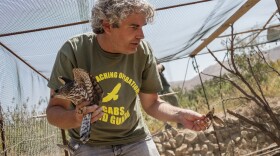
Ruth Sherlock
Ruth Sherlock is an International Correspondent with National Public Radio. She's based in Beirut and reports on Syria and other countries around the Middle East. She was previously the United States Editor for the Daily Telegraph, covering the 2016 US election. Before moving to the US in the spring of 2015, she was the Telegraph's Middle East correspondent.
Sherlock reported from almost every revolution and war of the Arab Spring. She lived in Libya for the duration of the conflict, reporting from opposition front lines. In late 2011 she travelled to Syria, going undercover in regime held areas to document the arrest and torture of antigovernment demonstrators. As the war began in earnest, she hired smugglers to cross into rebel held parts of Syria from Turkey and Lebanon. She also developed contacts on the regime side of the conflict, and was given rare access in government held areas.
Her Libya coverage won her the Young Journalist of the Year prize at British Press Awards. In 2014, she was shortlisted at the British Journalism Awards for her investigation into the Syrian regime's continued use of chemical weapons. She has twice been a finalist for the Gaby Rado Award with Amnesty International for reporting with a focus on human rights. With NPR, in 2020, her reporting for the Embedded podcast was shortlisted for the prestigious Livingston Award.
-
With its health care system already in dire condition, conflict-ridden Yemen faces what Doctors Without Borders is calling a potential "catastrophe" as COVID-19 spreads.
-
The Middle Eastern country had relatively few cases and had relaxed its shutdown. Residents will be asked to avoid outings except for emergencies.
-
"Hydroxychloroquine is included in the [Syrian] national case management guidelines for COVID-19," though there's no evidence that it's effective, a World Health Organization representative tells NPR.
-
Even with stringent lockdowns, the coronavirus has spread through migrant communities in some Middle Eastern countries where foreign workers live in cramped quarters.
-
Every year, some 2.6 million birds are shot or die after being trapped in illegal nets in Lebanon. "This country is a black hole in terms of protection," says a conservationist.
-
The Lebanese government is encouraging departures, but the U.N. objects. "We are at the service of the refugees," says a Lebanese security official, "but we have reached the limit of our capability."






